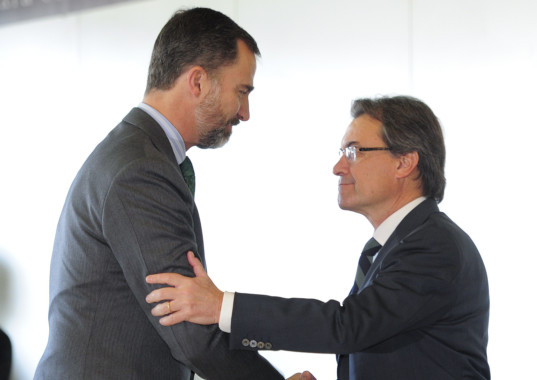
Madrid: Growing support for Catalan independence will be the biggest political issue facing Spain’s new king, the region’s top leader has said before Prince Felipe’s ascent to the throne on Thursday.
Artur Mas said he would cut short a planned trip to the United States to attend the ceremony, and he hoped his presence would help to nurture the “institutional relationship between Catalan and Spanish institutions”.
Felipe, 46, will take the crown at a defining time for Spain: along with a fragile economic recovery and rampant unemployment across the country, the wealthy north-eastern region of Catalonia has vowed to hold a referendum on independence in early November. The central government, led by the prime minister, Mariano Rajoy, is intent on preventing the referendum, which it calls “unconstitutional”.
The prince has hinted that he understands the magnitude of the challenge ahead of him. In his first speech after the announcement that King Juan Carlos would abdicate, he urged Spaniards to unite for a better future. “In difficult periods such as the ones we are going through, past experience in history shows us that only by uniting our desires, putting the common good ahead of individual interests and promoting the creativity of each person, do we succeed in advancing towards better scenarios,” he said.
Many see the Catalan-speaking king-in-waiting as someone who may be able to break the political stalemate between Madrid and Barcelona. Albert Pont, a pro-independence leader of a Catalan business organisation, told El País recently: “Felipe VI is the last tool available to the state to resolve the Catalonia issue in a peaceful, orderly and agreed manner.”
It’s a view echoed in the Basque country, where the push for more powers has gathered momentum in recent months, including a declaration of self-determination adopted by MPs in the region. Hours after the abdication announcement, the Basque leader Iñigo Urkullu encouraged the next king to address a new state model “to respond to the aspirations of the various nations that make up the Spanish state”.
Catalonia’s Mas was more muted in his assessment of what role the new king could play. “From the political point of view, the Catalan issue is the most important one for the new king,” he said, adding that it was “too early to know” how successful he would be. “We have to give him some time to try to do something about this issue.”
Even if Felipe has the will to navigate the wide gulf between the two parties, Mas said, he will have very little room for manoeuvre. “They don’t have real executive powers. So if the central government or the Spanish political forces say no, the king has no real possibilities to impose an agreement.”
Recent European election results point to growing support for independence in Catalonia. While the economy and job creation dominated the campaign trail across Spain, Catalan voters were confronted with the question of independence. The hardline secessionists Esquerra Republicana won the election in the region with a 24 per cent share of the vote, up from 9 per cent in the last elections. In total, 55 per cent of Catalan voters backed parties pushing for a referendum on independence, compared with 38 per cent last time.
The results echoed polls showing that a strong majority of the region’s 7.5 million residents want a referendum on independence. The proportion who would vote to break away from Spain, according to the same polls, is around half.
In April, Spain’s parliament voted overwhelmingly to reject a request by Catalonia to hold a referendum on independence. Mas said the Catalan parliament was now working on a law that would allow the region to hold its own non-binding consultation on independence. The law will probably be approved in September, granting the region powers to push forward with its referendum as planned for 9 November.
Once the consultation law is passed, Mas said, two things can happen. The best-case scenario, he said, “would be that the central government lets us go ahead without intervening in this specific consultation”. The worst-case scenario would be a court challenge of the Catalan law by the central government, a move that would see the consultation suspended for at last five months, he said. In that case, Mas said, the “last legal tool” would be to call early elections that could act as a de facto poll on independence.
The Socialists have suggested a third option, an agreement negotiated by the central government parties in Madrid to offer the region more autonomy. Any such offer would have to be put to Catalans in a referendum, Mas said, preferably coupled with the question of independence. “Some people say that it can happen in the next few months,” he said of this third option, adding that he was “quite sceptical”.












